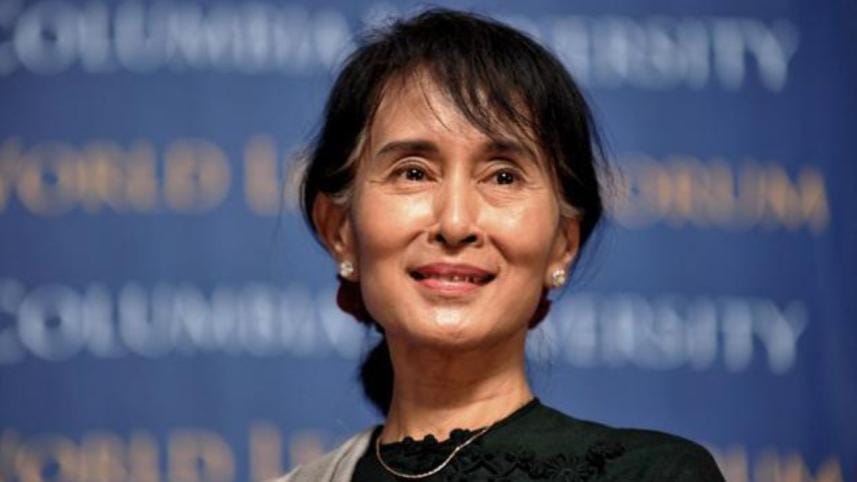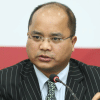Suu Kyi for party president or foreign minister?

The February 17th meeting was the third between Aung San Suu Kyi and military commander-in-chief Senior General Min Aung Hlaing since the National League for Democracy (NLD)'s electoral victory in November last year.
The meeting came in the wake of the extension of the term of the military chief and his deputy for another five years against existing regulations that require the army chief to retire at the age of 60, which Hlaing reaches this year.
Moreover, Chapter VII of the Constitution states that "the President shall appoint the Commander-in-Chief of the Defense Services with the proposal and approval of the National Defense and Security Council (NDSC)." Min Aung Hlaing is neither approved by the NDSC nor appointed by the president who is yet to be named.
One important development after the three-rounds of talks is that the much-hyped possible amendment of Article 59(f) has since been abandoned. While the military chief has said that doing so would be unconstitutional, Suu Kyi has said that she would not try to amend the Constitution for at least two years.
Although the NLD has not yet confirmed the names of the president and a vice-president, there are some media reports that Suu Kyi would take the job of foreign minister.
The big question is whether Suu Kyi will lead a ministry, which would become part of the powerful body NDSC, or remain as NLD party president.
Chapter V of the Constitution states that the NDSC would be formed by 11 members - the president, the two vice-presidents, speakers of both houses of the Parliament, commander-in-chief and deputy commander-in-chief of the defence services, defence minister, foreign minister, home minister and border affairs minister.
Despite NLD's overwhelming majority in both houses of the Parliament, the current Constitution gives the military an upper hand over the civilian government. Of the 11-member council, six members would be from the military establishment. Only five of them - the president, one vice-president, speakers of both houses of the Parliament and the foreign minister - would be from the civilian government.
Among others, NDSC, which is the highest decision-making body, will have the authority to declare national emergency for the military to take charge of all branches of the government - executive, judiciary and legislative.
If Aung San Suu Kyi were to become the foreign minister, she would have to abandon her party presidency. But NDSC would provide her a platform to interact closely with the military leadership and any critical issues arising out of such meetings.
As foreign minister, she would be leading the most important ministry under the civilian government. Also as the top diplomat of the country, her position would allow her to engage in the day-to-day diplomatic businesses.
However, it would be awkward for a foreign minister to rule from above the president, which Suu Kyi unequivocally has said that she would.
On the other hand, if she were to remain party president, she would indirectly be able to oversee the government, similar to what Sonia Gandhi did during the Indian National Congress-led United Progressive Alliance (UPA) coalition government in neighbouring India.
Mrs. Gandhi refused to become the prime minister but exercised enormous power and influence as president of the Indian National Congress and chairperson of the UPA.
Should she choose to remain as party president, NLD's overwhelming majority in both houses of the Parliament coupled with Suu Kyi's popularity and the respect she earns within the NLD hierarchy would perhaps see lesser internal conflicts.
As Suu Kyi has said that she would not try to amend the Constitution at least for the next two years, this could give her better political leverage to execute her "above president" role more efficiently and effectively.
By now, we all should understand that the military is unwilling to give up power basically for two reasons - the lingering fear that they could be prosecuted for the crimes they had committed during military rule and because of the ongoing fragile peace process with the country's ethnic armed groups. Whether one agrees or not, Myanmar's military considers itself as the guardian and protector of the state.
Regardless of whichever role Suu Kyi chooses to play, I think abandoning constitutional amendment at this juncture is good for the country's political transition. Otherwise, NLD would have made huge sacrifices, including the chief ministers of Rakhine, Shan and Kachin states, as well as the Yangon region.
As the people of Myanmar from different ethnic and religious backgrounds showed their trust and hope on Aung San Suu Kyi and her NLD party, it is imperative that they are not betrayed.
The writer, PhD, is Assistant Professor at the Jindal School of International Affairs, O.P. Jindal Global University, and Director of the Centre for Southeast Asian Studies. He is the author of three books on Myanmar, including the forthcoming Myanmar: A Political History available from Oxford University Press.




 For all latest news, follow The Daily Star's Google News channel.
For all latest news, follow The Daily Star's Google News channel.
Comments